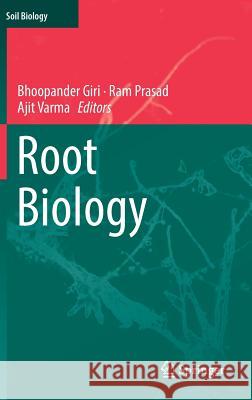Root Biology » książka



Root Biology
ISBN-13: 9783319759098 / Angielski / Twarda / 2018 / 519 str.
Root Biology
ISBN-13: 9783319759098 / Angielski / Twarda / 2018 / 519 str.
(netto: 960,71 VAT: 5%)
Najniższa cena z 30 dni: 963,86
ok. 16-18 dni roboczych.
Darmowa dostawa!
The book `Root Biology' written by experts in the field, covers latest research on cellular, genetic, physiological and ecological developmental facets of root growth as well as the interaction of root with an array of microbes whether for the establishment of symbiosis, increasing plant growth or protecting plant from pathogens/attackers.
Chapter 1. Insights into Pivotal Role of Phytohormonal Cross Talk in Tailoring Underground Plant Root System Architecture.- Chapter 2. Effects of Strigolactones on Plant Roots.- Chapter 3. Root Hair Growth and Development in Response to Nutrients and Phytohormones.- Chapter 4. Morphological and Symbiotic Root Modifications for Mineral Acquisition from Nutrient-Poor Soils.- Chapter. 5 Root Exudates and Microbial Communities Drive Mineral Dissolution and the Formation of Nano-size Minerals in Soils: Implications for Soil Carbon Storage.- Chapter 6. Root exudates dominate the colonization of pathogen and plant growth promoting rhizobacteria.- Chapter 7. Biocontrol of Soil-borne Root Pathogens: An Overview.- Chapter 8. Biological Control of Root-knot and Cyst Nematodes using Nematophagous Fungi.- Chapter 9. Optimizing Growth and Tolerance of Date Palm (Phoenix dactylifera L.) to Drought, Salinity and Vascular fusarium-induced wilt (Fusarium oxysporum) by Application of Arbuscular Mycorrhizal Fungi (AMF).- Chapter 10. Improvement of Salt Tolerance in Rice Plants by Arbuscular Mycorrhizal Symbiosis.- Chapter 11. Bioprotection of soybean plants from drought stress by application of bacterial and fungal endophytes.- Chapter 12. Perspectives of Rhizobacteria with ACC Deaminase Activity in Plant Growth under Abiotic Stress.- Chapter 13. Root-Microbe Interactions: Understanding and Exploitation of Microbiome.- Chapter 14. Unfolding the Role of Rhizomicrobiome towards Sustainable Agriculture.- Chapter 15. Morphological and Physiological Aspects of Symbiotic Plant-Microbe Interactions and their Significance.- Chapter 16.- Impact of Climate Change on Root-Pathogen Interactions.- Chapter 17. Arbuscular Mycorrhizal Fungi and Their Responses to Nutrient Enrichment.- Chapter 18. Relationship Between Arbuscular Mycorrhizas and Plant Growth: Improvement or Depression?.- Chapter 19. Arbuscular Mycorrhizal Fungi Symbiosis and Conservation of Endangered Tropical Legume Trees.- Chapter 20. From mycorrhizosphere to rhizosphere microbiome: The paradigm shift.- Chapter 21. Growth Response of Different Species and Provenances of Jujube Seedlings to Inoculation with Arbuscular Mycorrhizal Fungi.
Dr Bhoopander Giri: Received his Ph.D in Mycorrhizal Research from the Department of Botany, University of Delhi in 2001. He is currently working as an Assistant Professor at the Department of Botany, Swami Shraddhanand College, University of Delhi, Delhi. He is a recipient of CSIR Research Associateship (2003), DST Young Scientist Fellowship (2005), and Raman Post Doctoral Fellowship for United Sates of America (2014). He has served as a General Secretary (from 2013-2015) for International Symbiosis Society (ISS), USA. Dr Giri is a life-member/member of many prestigious academic societies, like Indian Science Congress Association, Association of Microbiologists of India (AMI), Indian Society of Mycology and Plant Pathology, Indian Mycological Society, Delhi University Botanical Society, Botanical Society of America, International Symbiosis Society, International Society of Applied Life Sciences. Besides, he is invited as reviewers to review several manuscripts from internati
onal and national journals, including Experimental and Environmental Botany, Planta, Applied Soil Ecology, Journal of Plant Growth Regulation, Agroforestry System, Colloids and Surfaces B: Biointerfaces, Scientia Horticulture, Acta Physiologia Plantarum, Spanish Journal of Agricultural Research. Journal of Experimental Botany, Institute for Life Long Learning (ILLL), University of Delhi (e-content) and UGC-CEC (pre-view subject expert, Proceedings of National Academy of Sciences, India. Dr Giri has published more than 30 papers in the national and international peer-reviewed journals, and books. Recently, his paper “Arbuscular mycorrhizal fungi in alleviation of salt stress” published in Annals of Botany ISSN 0305-7364 104: 1263-1280 Oxford Press, UK has been listed among TOP 10 Cited Publications (from 2009-2014) in the area of Biological Science and agriculture by International Comparative Performance of India’s Research Base, Department of Science and Technology Report 2015, India. He has presented research papers in several national and international conferences (Switzerland, Canada and USA etc). He is a recipient of ISCA best poster presentation award for 2010-2011.
Dr Ram Prasad: Assistant professor at Amity Institute of Microbial Technology, Amity University, Noida, India. His research interest focuses on plant microbe interaction, nanobiotechnology, and microbial biotechnology including fungal biology. Dr Prasad has edited several books and has a number of research papers and review articles to his credit in the journals of international repute. During 2014, Dr Prasad has been awarded American Cancer Society UICC International Fellowship for Beginning Investigator, USA.
Prof Dr Ajit Varma: Professor Varma has completed his PhD at the age of 25 years from Allahabad University and Former Professor, School of Life Sciences, Jawaharlal Nehru University, India. Presently, he is the Distinguished Scientis
t & Professor of Eminence of Amity Institute of Microbial Technology; Pro-Vice Chancellor, Ritnand Balved Education Foundation, and Vice Chairman, Amity Science, Technology & Innovation Foundation Amity University Uttar Pradesh, India. He has published more than 314 papers in reputed journals and has been serving as an editor in Chief of Soil Biology Series, Springer Verlag Germany. Dr Varma is the Fellow of Alexander-von-Humboldt Society, Germany, elected Fellow of National Academy Agricultural Sciences and Fellow of Microbiology Society of India.The book ‘Root Biology’ written by experts in the field, covers latest research on cellular, genetic, physiological and ecological developmental facets of root growth as well as the interaction of root with an array of microbes whether for the establishment of symbiosis, increasing plant growth or protecting plant from pathogens/attackers.
1997-2026 DolnySlask.com Agencja Internetowa
KrainaKsiazek.PL - Księgarnia Internetowa









